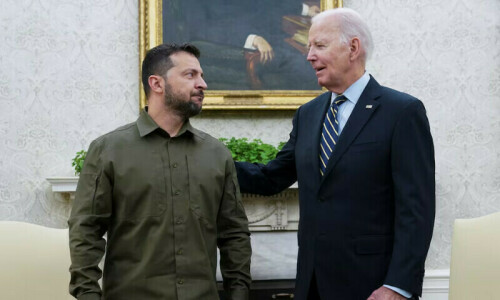Pakistani and Indian flag — File Photo
KARACHI: Peace and human rights activists from both India and Pakistan have called for opening more consulates so that more people can apply for visas and benefit from the new and relaxed via policy.
In a joint statement, signed by over 60 civil society members from both sides of the border, the activists have suggested that new consulates be opened in Karachi, Hyderabad and Lahore in Pakistan, and Mumbai, Hyderabad Deccan, Jalandhar, Chennai and Calcutta in India.
They also gave other suggestions which the governments of India and Pakistan could use to improve diplomatic relations.
Referring to the recently concluded negotiations between the Indian and Pakistani foreign ministers, the statement pointed out that the proposed policy would only benefit selected categories of visitors for the time being.
The activists also said that the humiliating condition of tourists’ reporting to the police after they reach and leave their destinations should be eliminated.
They suggested that urgent steps be taken to facilitate access to information by allowing the free distribution of newspapers, journals and other publications and removing bans on channels from across the border.
They said that since both governments had expressed their commitment to tackle the growing menace of religious intolerance, extremism and violence, another urgent task they needed to undertake was setting up a joint commission of experts, including historians and educationists of impeccable integrity, to review the textbooks. This would help identify all inter-faith and inter-state hate material and the committee would suggest effective ways to remove them from the school curriculums.
However, the activists appreciated the move, especially in the light of events which have caused the relationship between the two countries to grow extremely strained, marred for decades by bitterness and an acute trust deficit.
The civil society members said that they were confident that policy makers of India and Pakistan were not oblivious to the fact that the open interaction between the peoples was the key to developing a relationship of mutual understanding, lasting friendship and durable peace.
They also welcomed the decision of releasing fishermen and sick prisoners languishing in jails in both countries. But, they said, the decision would only be of advantage if concrete measures were taken to put a full stop to the inhuman practice of arresting poor fishermen and seizing their boats. In this context, said the statement, a decision be taken to ensure the implementation of the agreement on consular access in letter and spirit.
They included the immediate notification of arrests by either side, consular access to all prisoners within three months of arrests, their release within a month of completion of their sentence and confirmation of their national status. The activists said that this was a long-awaited-for but welcome move — but would only be helpful if the decisions were implemented without further delay.
At the end, the statement said that for lasting peace between the two countries, India and Pakistan would eventually have to sit down and discuss more important issues, such as Siachen or Sir Creek.
People from Pakistan who signed the statement included: Dr Kaiser Bengali, Mir Tahir Bizenjo, B.M. Kutty, Dr A.H. Nayyar, Karamat Ali, Sheema Kermani, Zulfiqar Halepoto, Samina Khan, Javed Qazi, Fazil Jameeli, Farid Awan, Zeenat Hissam, Zubaida Mustafa, Jami Chandio, Dr Jaffer Ahmed, Syed Shamsuddin, Irfana Mallah, Amar Sindhu and Mehanaz Rahman. Those from India included, journalists Jatin Desai and Kuldip Nayyar, film makers Mahesh Bhatt and Anand Patwardhan, social activist Mazher Hussain, journalist and ex MP Shahid Siddiqui and academician Dr Amrita.












































